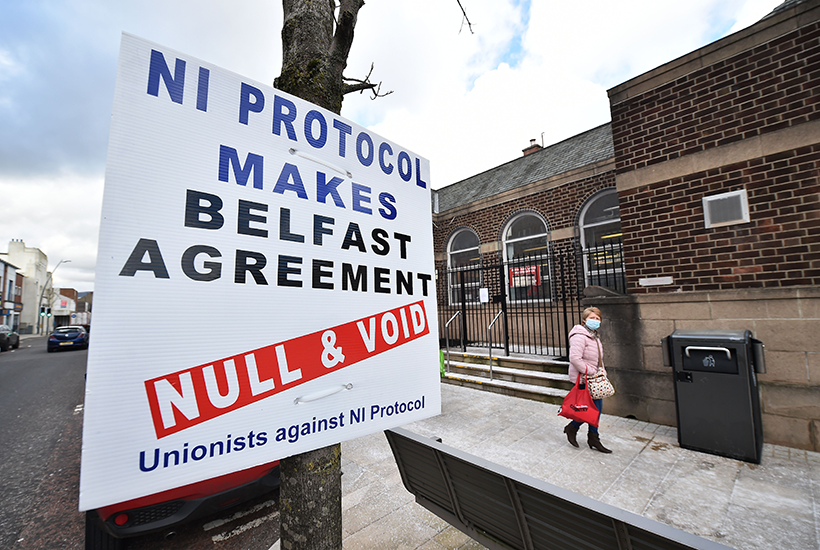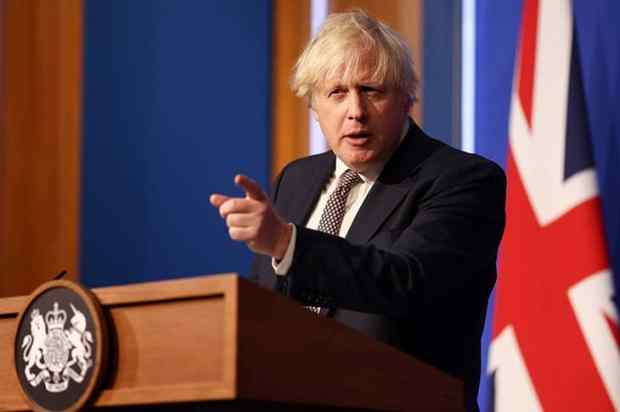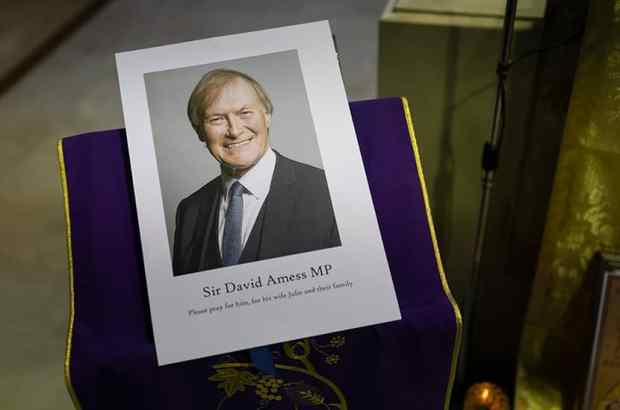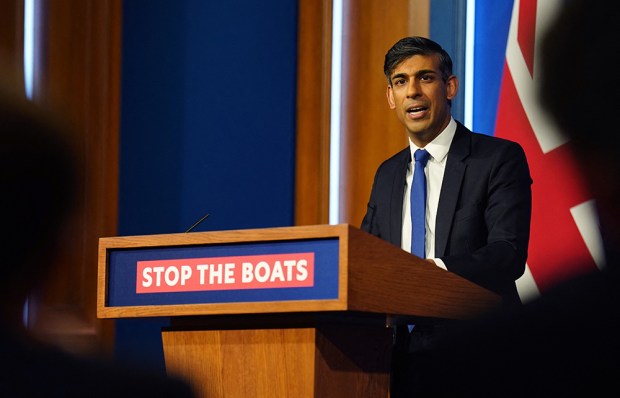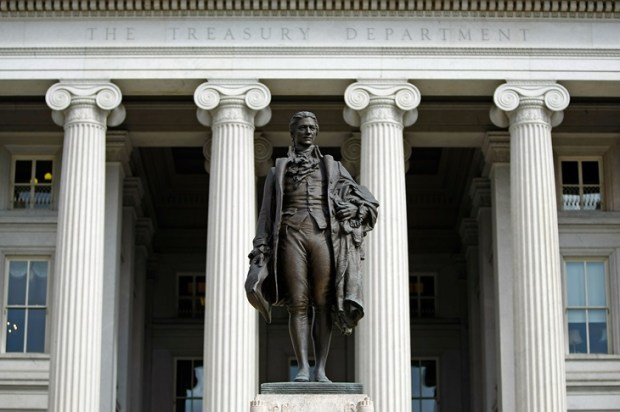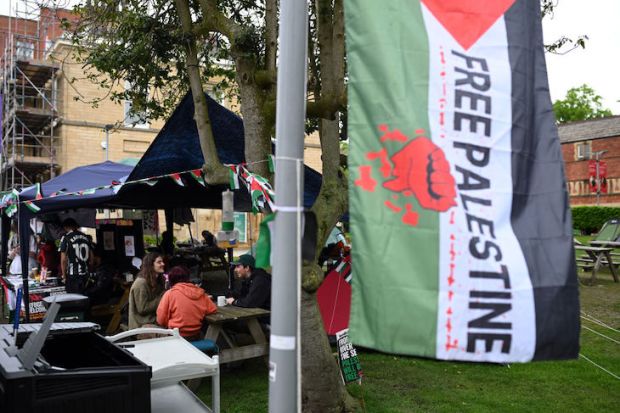Ursula von der Leyen now admits that she overreacted in the EU’s vaccine row with the UK. She has spoken of her ‘regret’ that Article 16 of the Northern Ireland border protocol was triggered by the European Commission in a Friday night fit of pique at the end of last month. But there is a sense in Brussels that the British are still trying to exploit her misstep. This claim is not entirely baseless. The UK is getting increasingly worried about the protocol, and clearly does see a chance to push for concessions now that the Commission has surrendered the moral high ground.
The Northern Ireland protocol was agreed by Boris Johnson as he struggled to get a Brexit deal in time for the 2019 general election. The bureaucracy it causes is already leading to problems. The major UK supermarkets have warned of an ‘unworkable’ situation once it is implemented in full when the various grace periods come to an end this year. Amazon deliveries have already been disrupted. In short, the protocol is interfering too much in the everyday life of citizens.
The Commission’s decision to (albeit briefly) invoke Article 16 has exacerbated the difficulties. It has increased the political pressure on Unionists to demand that the UK government use Article 16, which allows either side to take unilateral action, to deal with the current problems.
The extent to which people in Northern Ireland are being cut off from British suppliers is fast becoming a challenge to their identity. In the late 1990s, much was made of the so-called ‘garden centre Protestant’. This group of voters were regarded as politically moderate Unionists who preferred tending their gardens to marching in the streets. Their backing for the Good Friday Agreement was regarded as crucial. Now, in a move that could have been designed to alienate this group, they can’t order from UK gardening catalogues as easily as they used to, due to the bureaucracy involved in shipping to Northern Ireland. To send something from Somerset to Belfast is almost as much of a faff as exporting to the EU itself.
The protocol was meant to simultaneously protect the single market and the peace process. It is hard to think shipping a couple of roses from Great Britain to a gardener in Ballymena is a threat to the single market, yet the current rules make it tricky. If the gardener ordered roses from Dublin, though, they would arrive without a problem.
The EU can say that this is what the protocol sets out and the UK signed up to it. But the challenge is that greater friction in trade with Great Britain for goods for merely personal use may be considered a long-term threat to peace and stability. It is already causing uproar among dismayed Unionists.
This matters, because the Northern Ireland Assembly’s consent is required for these arrangements every few years. The first protocol vote will come in 2024, and there’s a risk that the campaign to scrap it starts now.
The UK government’s message to Brussels that ‘the best way to make the protocol survive is to make people not notice it’ is designed to get it off the hook for some of what it signed up to — but it is essentially correct. The more it disrupts people’s lives, the more it will be disliked. There is a growing risk that the next Northern Ireland Assembly elections, expected in May next year, will turn into a proxy referendum on the protocol. This would be deeply destabilising, even if, as polls currently suggest, Unionists fall well short of garnering an anti-protocol majority.
The worst of it is that the grace periods for implementing various parts of the protocol start finishing at the end of next month. From 1 April, export health certificates will be needed for meat, poultry, milk and eggs. If more of the protocol’s red tape descends as the year goes on, the backlash will grow. In a place where the regional speciality is a cooked breakfast, it would be a problem if sausages from mainland Britain were barred from Northern Ireland. This is why the UK government wants to extend various grace periods beyond the next Stormont elections.
Another risk is that the DUP will pull out of the devolved institutions in protest at the protocol. Following the Good Friday Agreement, they became the dominant Unionist party in Northern Ireland by outflanking the more moderate Ulster Unionists. Influential figures in their ranks now fear the same might happen to them thanks to the hardline Traditional Unionist Voice party. (A recent poll suggested that 23 per cent of their voters from 2017 have moved to the TUV.) So the DUP leader, Arlene Foster, is under pressure to do something dramatic. She’s already blamed for having been too trusting of Johnson’s assurances that he would never accept regulatory checks in the Irish Sea ‘damaging the fabric of the Union’.
If the DUP pull out of the devolved institutions, thereby collapsing them, we could be in a nightmare situation where direct rule from London had to be imposed to fully implement the protocol. In Westminster, nerves are such that some UK-wide policies are being put on hold on the grounds that they might not apply to Northern Ireland. The view is that now is not the time to provide a further demonstration of Northern Ireland’s different status.
Some think it is worth trying to renegotiate with the EU to see what Brussels would demand for, say, a special agreement to make it easier for agricultural products to go from Great Britain to Northern Ireland. Brussels, however, will be waiting for such a request and is likely to demand too high a price; one that would restrict the UK’s ability to negotiate trade deals with other partners as it would require us to follow EU rules on animal and plant health in perpetuity.
Another option being considered in Whitehall is a bill that would require large businesses to offer their products across the whole of the UK. Firms could not just decide not to export to Northern Ireland because of the cost and bureaucracy involved. This might calm the anger of those in Carrickfergus who find that British companies will no longer ship to them. But this idea is far from universally popular. One cabinet minister dismisses it as a ‘crude fix’.
Whether the EU and the UK can make the Northern Ireland protocol work is a test of whether the two sides can find pragmatic ways to work together. If they cannot solve an issue that is meant to be all about preserving a peace process, it will bode ill for the whole future relationship.
Got something to add? Join the discussion and comment below.
You might disagree with half of it, but you’ll enjoy reading all of it. Try your first month for free, then just $2 a week for the remainder of your first year.


